The content of the article
Pets, one way or another, become full members of the family. Any new changes in their behavior, suddenly appearing symptoms of certain diseases are cause for concern for the owners. It is hard not to notice the feline creak of teeth from the first day a kitten appears in the family. "Foster parents" such a sound makes you wonder - is this normal? Veterinarians regard this symptom as a normal behavioral reaction or manifestation of a disease.
Dental health
The general condition of the teeth is one of the indicators of the overall health of the feline family. Teeth may not be sick in pets at all, but their various pathological processes lead to a violation of other organs and systems of the body.
Teeth as an element of the digestive system are involved in the direct nutrition of cats. With the help of them, pets capture food, so that it enters the oral cavity. This is where the digestion process begins. Any violations in the structure of the teeth and the work of the jaw apparatus lead to defective absorption of nutrients and other necessary elements.
Often, tooth enamel in cats deteriorates when fed exclusively with dry food. But you can not constantly reproach the animal with exceptionally soft food, as the jaw apparatus also deteriorates. The optimal solution in this case is the alternation of hard and soft feed in the daily diet.
Rattle while eating
Most often, cats or cats grind their teeth in the process of absorbing food. The appetite in animals is usually preserved, but the intake of any type of nutrition is accompanied by a creaking sound. This is observed when lacquering water or other liquids.
Pathological creak associated with chewing movements is usually a consequence of such phenomena:
- The inflammatory process in the oral cavity. Biting or chewing in a certain area of the mouth can cause pain, which is why the pet spares this part and tries to shift the entire load to a healthy place.
- Subluxation of the jaw. In this case, the creak appears at the moment the tongue protrudes. Joint failure is accompanied by an atypical sound.
Bruxism as a symptom of a disease
In medical practice, both human and animal, there is the term "bruxism", meaning creaking sound, unrelated to food intake. You can examine the oral cavity of a cat yourself using a flashlight. It is necessary to pay attention to the condition of enamel, gums, examine the course of the dentition. If abnormalities are found, as well as in their absence, it is strongly recommended that you contact a veterinarian.
Veterinary dentistry describes several types of pathological condition of teeth in cats:
- Unequal development of anterior teeth or incisors. Almost not found in domestic, outbred cats.
- An incomplete complete set of the dentition is a hereditary sign of some thoroughbred cats.
- Disorders of the change of teeth from dairy to molars. In such cases, milk teeth interfere with the eruption of molars, causing the latter to become inflamed and rot.
- Malocclusion - incomplete closure of the teeth, leading to various problems.
- Excessive development of fangs makes cats open their mouths wider, which increases the load on the jaw and causes a squeak.
Bruxism is necessarily accompanied by pain. If you intend to help the animal with one of the above problems, you need professional help. Usually it includes dental correction of teeth and prescription of painkillers.
Stress
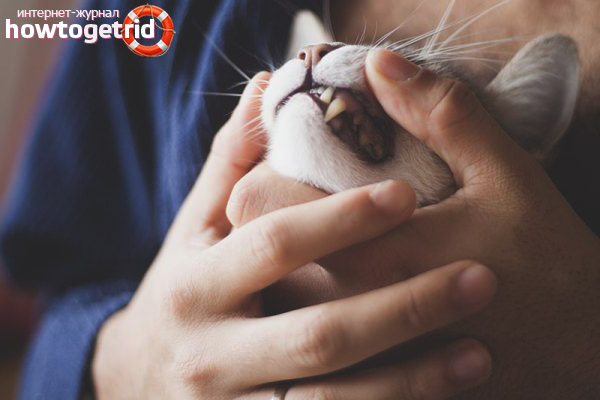
The negative influence of stress factors leads to the fact that even a person sometimes clenches his teeth.Cats have such a conditioned protective reflex. Stressful release of adrenaline leads to muscle contraction aimed at the survival of the body. Pets are also susceptible to such reactions, only muscle spasm can occur a little later.
Many factors can become a stress for a feline family:
- The long absence of the host to which the animal is attached.
- The emergence of new pets to the family.
- Fright.
- Seasonal sex drive and unmet need.
It is difficult to say how much each cat is subject to these factors. Species obtained by artificial breeding are believed to be more prone to nervous strain. Accordingly, they have a higher risk of bruxism.
The help of a veterinarian in these cases is to establish a diagnosis, prescribe sedatives. If possible, the cat and the owners should provide protection from negative influences.
Helminthic invasion
Gnashing of teeth among the human population is usually associated with worm infection. Often, feline bruxism is also associated with helminths.
The severity of a squeak depends on the number of parasites, local immunity in the intestines of a cat. Severe infection with many parasites causes bursting and itching in the digestive system, causing the animal to tap and grind its teeth. The invasion is aggravated by metabolic disorders, a lack of minerals and vitamins, which can lead to more serious cat health problems. Parasites living in the intestines of cats can also affect other organs, migrating throughout the body. Dangerous for the life of a pet is helminthic damage to the heart, brain, liver of animals.
Pets are shown annual prevention of helminthic lesions, regardless of whether they visit the street or not. Preventive measures are being taken with the help of medicines that are freely available in veterinary pharmacies.
In any difficult cases associated with changes in the behavior of cats or cats, it is recommended to seek the advice of a veterinarian.
Video: old cat problems

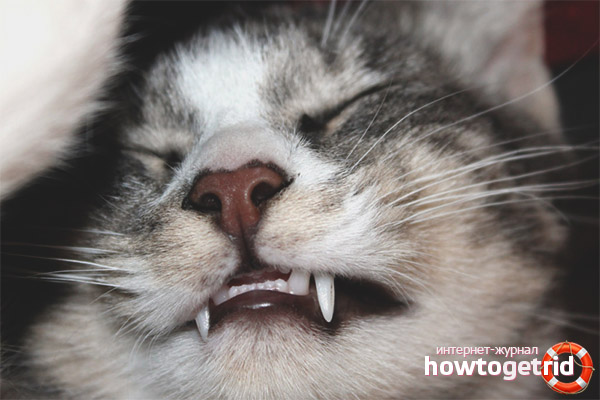
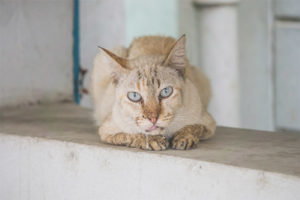
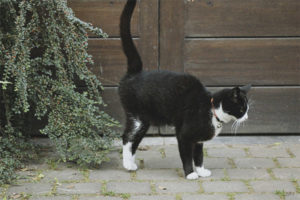
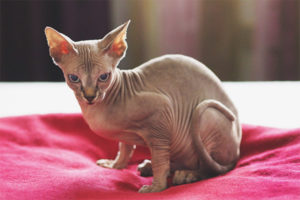
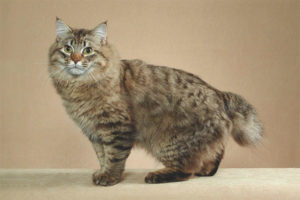
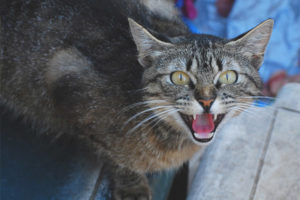
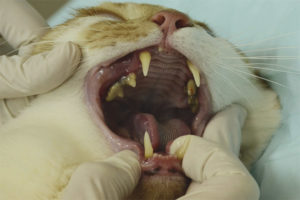
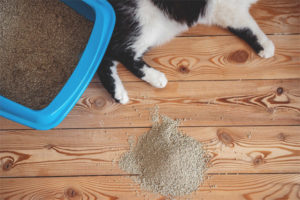
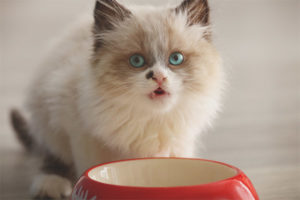
Submit